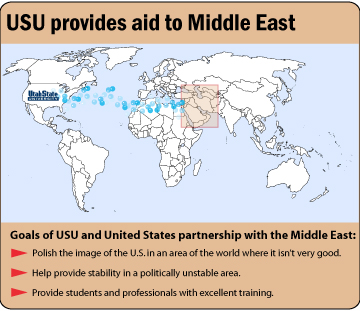Lab researches Middle East water conservation
When one thinks of the problems in the Middle East, political unrest often comes to mind. That is not the case for Mac McKee, director of USU’s Water Research Laboratory, who works to solve agricultural problems that face the Middle East.
“We have a project that is funded by the U.S. State Department that will provide training for Iraqi agricultural extension specialists that convey the latest and greatest (in agricultural technology),” McKee said.
As urban areas expand, populations grow along with the demand for food and water, and climate change forecast becomes more threatening, McKee said. When this happens, it is crucial for there to be people everywhere that are educated on agriculture and water, he said.
The reason the United States is involved in helping to educate people in the Middle East is because there is a generation of people that have the knowledge for water conservation and agricultural education that is retiring with few people to replace them, causing knowledge to be lost. The goal of McKee and others that are working on solving and preventing the water crisis in the Middle East is to prevent that from happening, he said.
USU has been helping provide education to Iraqis who are interested in learning about water conservation and research, he said. Since they cannot go into Iraq, the professionals who are training them are doing so in Ahman, Jordan, he said.
In November, some of the Iraqis will be coming to the United States to be taught on the latest techniques, McKee said. They are doing this in relation to the Iraqi Agricultural Extension Revitalization Program Consortium, he said. The Water Research Laboratory is representing USU in this program, along with four other universities who are helping to provide education to the Iraqi Agriculture Ministry, he said.
About two years ago, McKee and others at the WRL proposed a plan on how to educate people on water and agricultural solutions, he said. All 24 countries of the Arab Water Council agreed with the proposition, which started the movement and formation of the Arab Water Academy, McKee said. USU was the only university asked to meet privately with the AWA, he said.
“We met with Dr. Abu Zeid, Minister of Water and Irrigation in Egypt, and head of the AWC at the time,” McKee said. “He liked our ideas and pushed through the creation of (our ideas).”
This invited the idea of where to put the headquarters for education, which has been established in Dubai, McKee said.
“We are really trying to turn it over to the people of the Middle East,” McKee said. “Eventually the American Water Academy will hire an executive director who will hire out a smaller staff to help water research and management. The goal of the center is to be a research and an educational facility, where people can learn about the newest in water technology but continue to research and expand on their knowledge and share it with others.”
“My hope would be to help provide a joint master’s degree between Utah State and the students’ host nation university,” McKee said.
Working to make this hope a reality is an enormous team of individuals, all with different background in water and agricultural knowledge, he said. Many of those individuals are at USU, including Jagath Kaluarachchi, Winn Walker, Chris Fawson, Davon Bailey and many former students to these researchers and professors, he said.
McKee said he hopes this program will help to establish a better reputation for the United States in the Middle East.
“It’s important that America play a role here,” McKee said. “Water is getting scarcer all the time and it is important that the U.S. hit it head-on.”
McKee said he hopes the United States and USU’s involvement will do three things: polish the United States’ image in an area of the world where it isn’t very good, help to provide stability in a politically unstable area and provide students and professionals with excellent training.
As far as what McKee hopes these programs will accomplish, he said, “We believe it’s important that they expand their understanding of and access to modern techniques. We think it’s important that the Middle East becomes more responsive to water problems.”
–beck.turner@aggiemail.usu.edu

